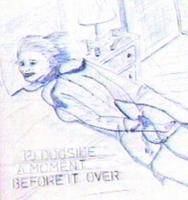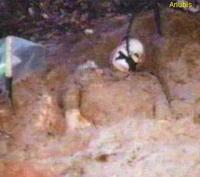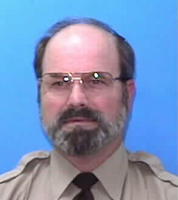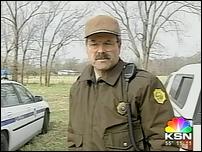Dennis Rader was into another PJ in January 1991. Now 45 years old, he was wary of PJs involving younger women or where a male was present. He saw older women as more vulnerable. Encounters with younger ladies had been difficult when they fought back. Males were just obstacles in the way of his intended conquests.
 Rader focused his attentions on an older woman who lived alone, 62 year old Dolores Davis. She only lived about a mile and a half from where he did, but there is no indication he was personally acquainted with her. Dolores had moved to the Park City area after years an an executive secretary in Wichita and was renting a house in an area without close neighbors. This undoubtedly piqued Rader's interest. He noticed her at her home one day and might have done some snooping or investigating to confirm her status as a single woman living alone.
Rader focused his attentions on an older woman who lived alone, 62 year old Dolores Davis. She only lived about a mile and a half from where he did, but there is no indication he was personally acquainted with her. Dolores had moved to the Park City area after years an an executive secretary in Wichita and was renting a house in an area without close neighbors. This undoubtedly piqued Rader's interest. He noticed her at her home one day and might have done some snooping or investigating to confirm her status as a single woman living alone.This would be another well-planned project. Using the pretext of being away for the weekend on a Scout camping outing in Harvey County, just to the north of Sedgwick County where Rader resided, he again invented an excuse to slip away from camp in the evening. It was a very cold night, below freezing. He drove back to his parents' home in north Wichita (apparently they may have been away that weekend) and changed out of his Scout uniform into his hit clothes. Rader then drove to the Baptist Church in Park City and parked his car, and set out on foot for the Davis residence. When he got there Dolores was still awake and reading in bed. He waited out in the cold for her to turn off the light and go to sleep. Using a cement block taken from a shed in the backyard, he rammed through the sliding glass door at the rear of the house. Dolores came out of the bedroom thinking someone had driven into her house, but there was Rader. He launched into the familiar line of being a vagrant in need of food, money and a car and told her he had to tie
 her up. Rader succeeded in tying her up in the bedroom. It's not known how long Rader lingered there, but Dolores helped to ruin his party by telling him she was expecting someone to arrive any minute. He ended her life by ligature strangulation. (Rader made a sketch of her final moments at a time soon after this murder).
her up. Rader succeeded in tying her up in the bedroom. It's not known how long Rader lingered there, but Dolores helped to ruin his party by telling him she was expecting someone to arrive any minute. He ended her life by ligature strangulation. (Rader made a sketch of her final moments at a time soon after this murder).Rader dragged the body outside and put it in the trunk of her car. He only drove a short distance to a lake area near I-135 by Park City and left the body and other evidence there under some trees. He then drove the car back to the Davis house and wiped it down for fingerprints, tossing the keys onto the roof. Rader then set out on foot, walking in a roundabout fashion back to the Baptist Church. Driving his own car, he returned to where he left the body and put it in his car. He meandered around to the north, and settled on a remote spot underneath a bridge in northern Sedgwick County as the dumping spot. After leaving her there, he went somewhere to change back into his Scout uniform and returned to camp. The following night he left camp again to come back
 to the dumping spot to pose and photograph the body. Rader says he had an encounter with a police officer at a place where he had to change clothes, but was let go after a few questions. (Soon after the murder, Rader took a photo of himself buried in a grave he says he had dug for Dolores Davis, wearing a mask and using a Polaroid camera activated with a mechansim triggered via a cord.)
to the dumping spot to pose and photograph the body. Rader says he had an encounter with a police officer at a place where he had to change clothes, but was let go after a few questions. (Soon after the murder, Rader took a photo of himself buried in a grave he says he had dug for Dolores Davis, wearing a mask and using a Polaroid camera activated with a mechansim triggered via a cord.) Only four months after this episode Rader was hired by Park City as compliance and animal control officer. He became a combination dogcatcher and local code enforcer. He was now part of the local law establishment. He gained a varying reputation ranging from efficient and friendly to overzealous and petty,writing citations if a lawn exceeded six inches in grass height. There were complaints against him, and several people were said to have moved away from Park City due to his mistreatment. No complaint ever resulted in disciplinary action, as local officials would usually side with Rader when dealing with citizens. There is only one record of a case going to court, where a woman contested a $25 fine levied against her by Rader over dog control. Rader showed up in court with a satchel a half- inch thick full of official documents and won the case.
Only four months after this episode Rader was hired by Park City as compliance and animal control officer. He became a combination dogcatcher and local code enforcer. He was now part of the local law establishment. He gained a varying reputation ranging from efficient and friendly to overzealous and petty,writing citations if a lawn exceeded six inches in grass height. There were complaints against him, and several people were said to have moved away from Park City due to his mistreatment. No complaint ever resulted in disciplinary action, as local officials would usually side with Rader when dealing with citizens. There is only one record of a case going to court, where a woman contested a $25 fine levied against her by Rader over dog control. Rader showed up in court with a satchel a half- inch thick full of official documents and won the case. One woman had a very disturbing story about Rader. There was no problem until after she got divorced and a new male friend came to live with her. Rader kept issuing citation after citation for among other things, items as trivial as having the wrong color garden hose. He didn't like the "inoperable vehicle" in the driveway the male friend was working on, and made it clear to the woman that if the man left the problems would cease. Rader started looking in her windows and one day was found examining a door that had been mysteriously broken. But it all culminated when Rader impounded her daughter's dog and had it put to sleep before anyone could reclaim it. The lady immediately moved out of Park City.
One woman had a very disturbing story about Rader. There was no problem until after she got divorced and a new male friend came to live with her. Rader kept issuing citation after citation for among other things, items as trivial as having the wrong color garden hose. He didn't like the "inoperable vehicle" in the driveway the male friend was working on, and made it clear to the woman that if the man left the problems would cease. Rader started looking in her windows and one day was found examining a door that had been mysteriously broken. But it all culminated when Rader impounded her daughter's dog and had it put to sleep before anyone could reclaim it. The lady immediately moved out of Park City.In a gender discrimination lawsuit filed in federal court, Rader's co-worker Mary Capps, who worked under Rader from 1998 until his arrest, alleged he was a terrible boss, cold, demanding and degrading. She described one incident of being trapped in her office and chased around the room, terrified. Capps stated that she complained weekly to Rader's supervisor about his ongoing behavior but was dismissed or simply referred back to Rader himself. Three formal complaints to the city of Park City
 were, by city procedures, channeled to her supervisor, Dennis Rader, who naturally did nothing about them. There were media reports after the arrest stating that Capps may have been drugged repeatedly with animal tranquilizers while working with Rader, although this was not mentioned in this lawsuit. A federal judge has dismissed the lawsuit, saying it was not filed within required time limits.
were, by city procedures, channeled to her supervisor, Dennis Rader, who naturally did nothing about them. There were media reports after the arrest stating that Capps may have been drugged repeatedly with animal tranquilizers while working with Rader, although this was not mentioned in this lawsuit. A federal judge has dismissed the lawsuit, saying it was not filed within required time limits. During the 1990s Rader served on two local boards in Park City. In 1996 his father William Rader died of natural causes. His mother Dorothea eventually began staying in a nursing home or at home with son Jeff. Rader's daughter Kerri attended Kansas State University, whose football team he was a huge fan of. In 2003 Kerri married a man from Michigan and went there to live. Son Brian joined the Navy and left the area for the East Coast. Rader was elected to the church council and assumed the position of vice president starting on January 1, 2004. According to church procedure, the vice president becomes council president after one year. The Raders remained quite active in their Lutheran church, with Dennis a trusted leader, helper and usher.
During the 1990s Rader served on two local boards in Park City. In 1996 his father William Rader died of natural causes. His mother Dorothea eventually began staying in a nursing home or at home with son Jeff. Rader's daughter Kerri attended Kansas State University, whose football team he was a huge fan of. In 2003 Kerri married a man from Michigan and went there to live. Son Brian joined the Navy and left the area for the East Coast. Rader was elected to the church council and assumed the position of vice president starting on January 1, 2004. According to church procedure, the vice president becomes council president after one year. The Raders remained quite active in their Lutheran church, with Dennis a trusted leader, helper and usher.  Despite all this, with the kids gone Rader found himself increasingly bored.
Despite all this, with the kids gone Rader found himself increasingly bored.The on-line Crime Library had published an article about the unsolved BTK case. It was thought BTK was dead, jailed or institutionalized perhaps. The subject had faded even in Wichita, and a whole generation of Wichitans were growing up without much knowledge of the case. Rader had thought about publicly reemerging later on in life. But then all of sudden BTK became a topic of interest again.
Next: BTK is Back